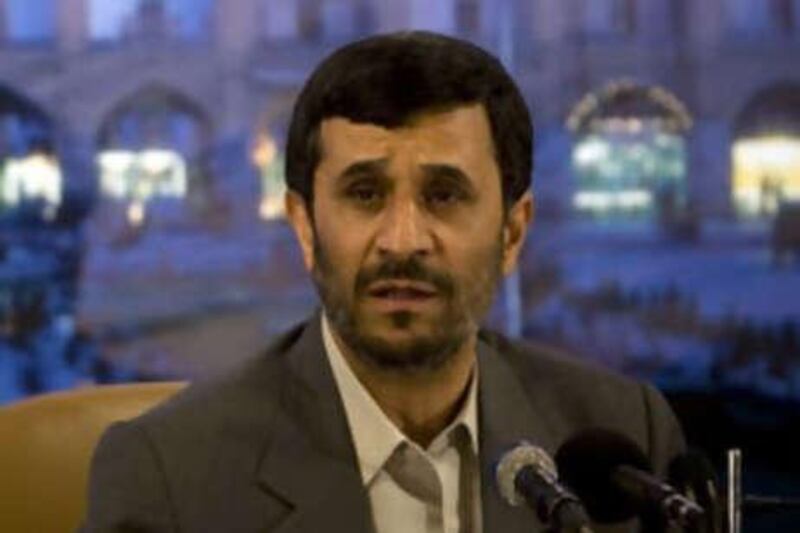With a deadline looming for Iran to freeze uranium enrichment or face new sanctions, the Iranian president has boasted that his country has nearly doubled the number of its centrifuges actively enriching uranium to more than 5,000. In a characteristically defiant mood, Mahmoud Ahmadinejad even maintained that western powers had backed down and now accepted this much higher level of nuclear activity. And in a dig at the Bush administration, he declared gleefully that the unprecedented presence of a senior US diplomat at the nuclear talks on July 19 was a "success" for Iran. Washington had previously ruled out any direct contacts with Iran on its nuclear programme unless Tehran first halted uranium enrichment.
Mr Ahmadinejad's remarks appeared calculated to goad western powers while playing to popular opinion at home. But his claim of dramatic progress in Iran's nuclear programme will be greeted with surprise and scepticism abroad. Iran announced in April it had started installing 6,000 new centrifuges at its underground facility near the central Iranian town of Natanz. But there had been no indication from the International Atomic Energy Agency, the UN's nuclear watchdog, that Iran was making significant progress: the organisation said in May that Iran had about 3,500 centrifuges running.
Mr Ahmadinejad has frequently exaggerated the prowess of Iran's nuclear programme, while its enrichment activities have been beset by technical problems, diplomats said. Tehran's critics are likely to see Mr Ahmadinejad's comments as evidence that Iran has misread the American diplomatic overture as weakness and could miss a rare opportunity to defuse the nuclear standoff by overplaying its hand. "The West wanted us to stop. We resisted and now they want to resume negotiations," Mr Ahmadinejad said during a visit to the northeastern city of Mashhad on Saturday.
But Iran analysts remain hopeful that Tehran may yet positively respond to the rare American gesture. "Ahmadinejad is not the sole, nor the most important, decision-maker in Iran on these matters," said Michael Axworthy, an Iran observer at the Institute of Arab and Islamic Studies at Exeter University in England. Even Mr Ahmadinejad appeared to suggest that Iran may yet be prepared to freeze temporarily its uranium enrichment programme, albeit with more centrifuges operating than when the West made Iran a conditional offer of incentives.
"Today they have agreed that the 5,000 to 6,000 centrifuges do not increase and that there is no problem if this number of centrifuges work," Mr Ahmadinejad said. Mr Axworthy, who is an author of two books on Iran and former head of the Iran desk at the Britain's Foreign Office, said: "I feel there is less heat and more potential for negotiation than a few weeks ago, but it's a roller-coaster situation. The positions of both Iran and the US look quite fluid and this could be fruitful in bringing about diplomatic progress. But it could also be dangerous because it could lead to misunderstandings."
The United States, Russia, China, Britain, France and Germany have offered Iran political, technological and economic incentives provided it suspends its uranium enrichment programme. To smooth the way for full negotiations on the offer, the six powers suggested a "freeze-for-freeze" during which Iran could continue enriching uranium at current levels, while the West would not push for further sanctions against Tehran.
Iran has refused to halt uranium enrichment but has been more ambivalent about the "freeze-for-freeze" formula. At a meeting in Geneva on July 19, the United States and Britain gave Iran two weeks to reply to the offers or face punitive action. Instead of addressing those offers at the talks, Iran presented an informal paper that made no mention of the incentives package or suspending uranium enrichment. Instead, it called for seven more rounds of talks and an end to sanctions against Iran.
It is unclear whether the conflicting signals from Tehran are a result of divisions within the regime or negotiating tactics. Iran said it was ready for negotiations but would not accept any preconditions, threats or deadlines. If Iran is planning to accept the "freeze-for-freeze" formula, it could help Mr Ahmadinejad save face if it appears he succeeded in pressuring the West to accept a freeze that allows Iran to keep spinning twice as many centrifuges than when the offer was made.
Iran's response so far is fuelling suspicions that Tehran is playing for time while it waits to see whether US elections in November will install a more conciliatory president in the White House. Barack Obama, the presumptive Democratic presidential nominee, said George W Bush's decision to send a senior diplomat to nuclear talks with Iran this month was a substantive move that Tehran should take seriously.
Mr Obama, who has said he will pursue a policy of greater engagement with Iran if elected, told a news conference on Friday that Tehran should not wait for the next US president to try to secure a deal over its nuclear programme. Condoleezza Rice, the US secretary of state, last week accused Iran of stalling and said Washington would push for more sanctions if Tehran, which has already been slapped with three sets of UN Security Council sanctions, ignored the two-week deadline.
US officials are mulling the possibility of attempting to curb Iranian petrol imports. Iran does not have enough refining capacity of its own while its ability to produce electricity has been hurt because of international sanctions that prevent Tehran acquiring spare parts from abroad needed to run its power stations. @Email:mtheodoulou@thenational.ae





